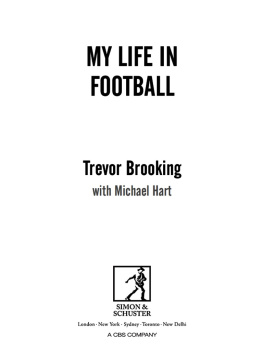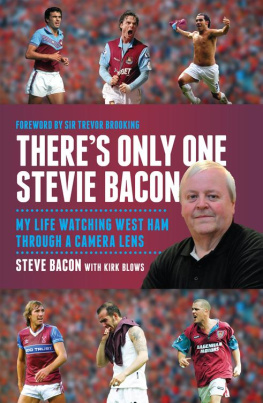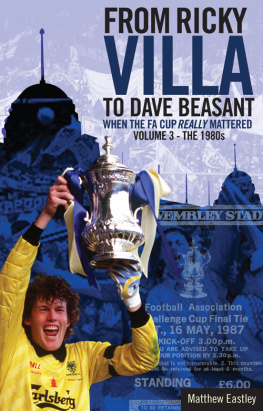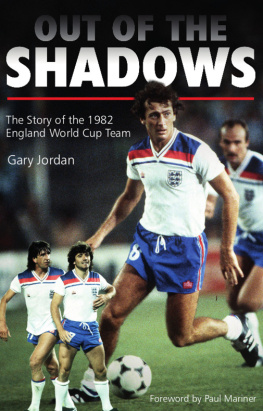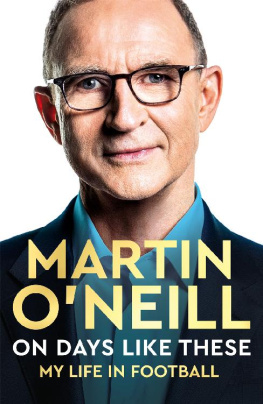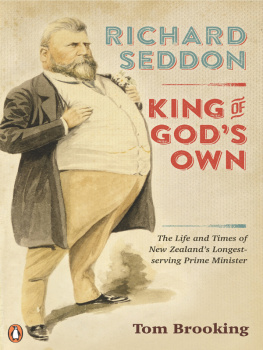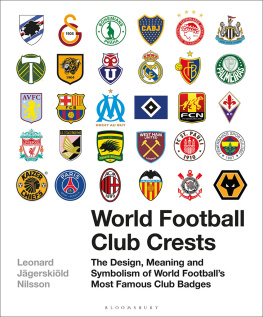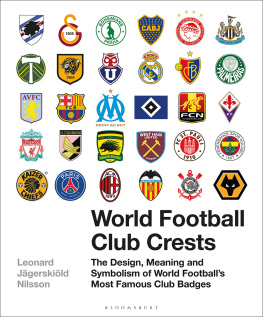MY LIFE IN FOOTBALL

First published in Great Britain by Simon & Schuster UK Ltd, 2014
A CBS COMPANY
Copyright Sir Trevor Brooking, 2014
This book is copyright under the Berne Convention.
No reproduction without permission.
All rights reserved.
The right of Sir Trevor Brooking to be identified as the author of this work has been asserted by him in accordance with sections 77 and 78 of the Copyright, Designs and Patents Act, 1988.
Simon & Schuster UK Ltd
222 Grays Inn Road
London
WC1X 8HB
www.simonandschuster.co.uk
Simon & Schuster Australia, Sydney
Simon & Schuster India, New Delhi
Every reasonable effort has been made to contact copyright holders of material reproduced in this book. If any have inadvertently been overlooked, the publishers would be glad to hear from them and make good in future editions any errors or omissions brought to their attention.
A CIP catalogue record for this book is available from the British Library
ISBN: 978-1-47113-044-1
Ebook ISBN: 978-1-47113-046-5
Typeset in the UK by M Rules
Printed and bound by CPI Group (UK) Ltd, Croydon, CR0 4YY
To Mum and Dad. who believed in me.
And to Ron Greenwood and John Lyall, who encouraged me to believe in myself.
CHAPTER 1
WHY I JOINED THE FA
I WAS WONDERING WHAT to do with the rest of my life when the Football Association called me at home one morning in the autumn of 2003. It was a few weeks after my 55th birthday. Alan Pardew had just taken over as manager of West Ham so my caretaker role there had finished. My Sport England commitment was over and although I had a small book-binding business, Colbrook, it ran very successfully without my presence every day. I remained a non-executive director at West Ham but, in truth, that wasnt going to occupy a great deal of my time. What are you actually going to do with yourself? asked David Davies, the FAs executive director.
He told me they were thinking of creating a new position at the FA. They thought that I had the kind of experience that made me an ideal candidate for the job. Apart from my football background, Id had more than ten years as chairman of the Eastern Region of the Sports Council and a further four years as chairman of Sport England jobs that gave me a deep insight into the worlds of sports politics, administration and the development of young talent.
This wide range of experience clearly appealed to Mark Palios, the new FA chief executive. Mark asked me to call, David told me on the phone that day. Hed like to meet you. So a few days later I met David Davies and Mark Palios in the quiet conference room of a west London hotel. Id known David for some years. Sir Bert Millichip, the former FA chairman, had lured him to the FA to oversee media matters. As a former BBC TV correspondent he had a lot of media experience and my own role at the BBC meant I had regular contact with him when England were on the road. The BBC were one of the few organisations usually given access to the England team hotel at home and abroad.
Although I knew Mark Palios had enjoyed a long playing career at Tranmere Rovers and Crewe Alexandra I couldnt remember ever meeting him. His appointment at the FA had been warmly received by most because, since his playing days, he had established himself in the world of finance and, at that time, his kind of expertise was desperately needed in the FA offices in Soho Square. I liked Mark from our first meeting. We got on well. He asked if I could remember when we had played against each other in the seventies. I couldnt. Obviously I didnt make much of an impression on you, he smiled.
He was right, though; we had played against each other. In September 1974 West Ham were lucky to survive a League Cup visit to Tranmere. Mark played in their midfield. The game ended goalless thanks largely to the heroics of the young West Ham goalkeeper Mervyn Day. In the replay a week later Mark again wore the number eight shirt in a Tranmere team that included a tricky 19-year-old winger called Steve Coppell. This time West Ham won 6-0 at Upton Park Bobby Gould scoring a hat-trick but eventually succumbed to an all-too-familiar defeat at Craven Cottage in the next round. I scored that night but Bobby Moore had the pleasure of leading Fulham to a 2-1 victory, interrupted by a floodlight failure, against his old team-mates.
It was obvious from the outset that if I accepted the FAs offer I would have to get along with Mark. We would need to have a sound working relationship. Although the job title was undecided, they wanted someone to oversee the development of the game from grass-roots level upwards. I was to be given total control of coaching and development at all levels of the game. I would be responsible for putting a coaching structure in place and I would also have a role in identifying future England managers and the development teams below that.
Mark explained that he was looking for someone with a credible reputation in football to work across the board. The credibility factor was important to him because he thought it might be difficult for him to get too deeply involved in some of the issues occupying the senior international team at that time. One of the most contentious episodes that autumn involved Rio Ferdinand. Mark hadnt been in the job long when Rio failed to take a scheduled drugs test. Rio was the worlds most expensive defender and his profile with Manchester United and England meant that he was a role model for many children.
Rio said that he had simply forgotten about the drugs test and left Uniteds Carrington training ground that day to go shopping. It was a big story that season, and in the days immediately before Englands European Championship qualifier in Turkey there was speculation that David Beckham and the team might actually go on strike in support of Rio! Mark had made it clear when he took the job that he cherished honesty, sportsmanship and high standards of discipline and behaviour, so the Ferdinand case inevitably became one of the first big tests of his leadership.
The FA appointed an independent tribunal that found Rio guilty of misconduct, banned him for eight months and fined him 50,000. Manchester United appealed on Rios behalf, describing the sentence as savage and unprecedented, but the punishment was upheld. The decision generated a lot of ill feeling among senior players, particularly Rios United team-mates in the England squad. Rio would not appear in the England team again until October 2004.
Mark knew that the fallout from this episode might make some elements of his role difficult, especially those directly involving the players, and he wanted me to be involved with the national teams. He wanted to focus on the financial side of an organisation that clearly required his specialist skills in budget restructuring. He also wanted to raise the stature of the governing body and improve the infrastructure and leadership team at Soho Square. From the football point of view, he wanted me to look at the technical side. Were we doing it right? Could we do it better? Les Reed, an ex-professional with extensive coaching experience, had been acting technical director since the departure of Howard Wilkinson. Mark wanted someone with a wider brief to take an overview of the game from the elite level down to the grass roots.
We knew that my lack of up-to-date coaching qualifications might become an issue. I had taken the FA coaching badges as a player at West Ham years before but these had now been superseded by the UEFA licensing system. Sure enough, the fact that I didnt have modern qualifications was quickly pounced upon by one or two mischievous individuals in the professional game when the FA announced my appointment. My proposed role didnt actually involve any coaching either of players or coaches. But some argued that I might have influence over who would be appointed to these roles in the future. So, in a sense, it was rather like a director of football role at a big club. If youre the director of a club you dont have to be a holder of the full pro licence to appoint a coach, do you? The important thing, surely, was to get in the right people to deliver the right coaching philosophy.

